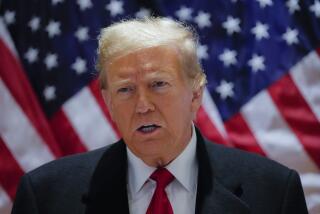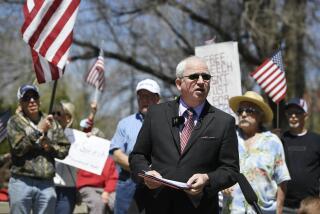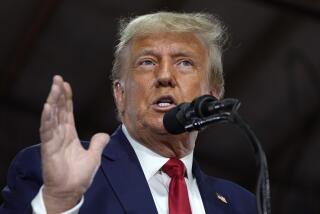Judge Curbs Testimony by North on Poindexter : Iran-Contra: Jurist skeptically accepts ex-White House aide’s claim of confusion. The prosecution may be hurt.
- Share via
WASHINGTON--In a decision that seems certain to handicap the prosecutors of Iran-Contra figure John M. Poindexter, a federal judge ruled Tuesday that questioning of former White House aide Oliver L. North must be strictly limited.
North contended in hearings last week that he was confused about what he knew from his own experience and what he concluded based on Poindexter’s testimony before Congress two years ago--testimony that cannot be used in Poindexter’s trial because of immunity conferred by Congress.
U.S. District Judge Harold H. Greene said Tuesday that he is skeptical about North’s claim of confusion about testimony by his ex-boss, Poindexter. However, Greene ruled that prosecutors may not ask North any questions relating to statements he made after Poindexter began his nationally televised testimony on July 15, 1987.
Poindexter, a former national security adviser in the Ronald Reagan White House, is scheduled to go on trial Jan. 22 on five felony charges in the Iran-Contra scandal. He is charged with conspiracy, two counts of false statements and two counts of obstructing Congress in connection with the Reagan Administration’s resupply of Nicaraguan rebel forces at a time when Congress had banned all military aid to the Contras.
Greene’s ruling will handicap federal prosecutors because they will be unable to use much of the testimony that North gave at his own trial last April, when he frequently stated that Poindexter was aware of his support for the Contras. North was convicted last May on three of 12 felony charges.
North told Greene last week that he knows Poindexter’s immunized testimony heavily influenced what he said at his own trial.
Greene’s ruling became necessary because Poindexter gave his sworn testimony in 1987 only after Congress had granted him immunity from criminal prosecution for his statements. Thus, the government’s prosecution of Poindexter must be based solely on evidence obtained by independent counsel Lawrence E. Walsh, without reliance on that testimony. Otherwise, a conviction of Poindexter could be thrown out on appeal.
North, during two days of hearings before Greene last week, said that he had difficulty remembering what he knew from his own experience and what he knew from having listened to Poindexter’s testimony. North made clear that he respects Poindexter and does not relish having to testify at the trial.
Greene did note that North testified to Congress several days before Poindexter appeared, adding that North’s “testimony to these bodies . . . could not have been influenced by the statements Poindexter made.”
Prosecutors will be permitted to question North on his congressional testimony and to explore subjects on which Poindexter did not testify.
“The court takes North’s alleged inability to differentiate with a grain of salt,” Greene said. “It seems unlikely that a witness who was a major and active participant in the events themselves would be unable to distinguish between the version of events described in another’s testimony and his own recollection of what occurred.”
However, Greene added that he wants to “err on the side of protecting Poindexter’s constitutional right not to be convicted with the use of his own testimony.”
The judge ruled also that the two prosecutors--Dan Webb, a former U.S. attorney in Chicago, and Howard Pearl--should not be disqualified from trying the case. He rejected contentions of Poindexter’s lawyers that Webb and Pearl are familiar with Poindexter’s immunized testimony.
In a related development, Justice Department attorneys and lawyers for former President Reagan filed additional legal papers arguing that Poindexter should be prevented from subpoenaing Reagan’s personal notes and diaries. Greene authorized such a subpoena last month, but it is being contested.
More to Read
Sign up for Essential California
The most important California stories and recommendations in your inbox every morning.
You may occasionally receive promotional content from the Los Angeles Times.










